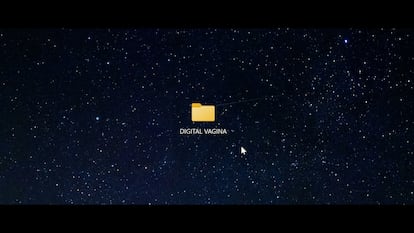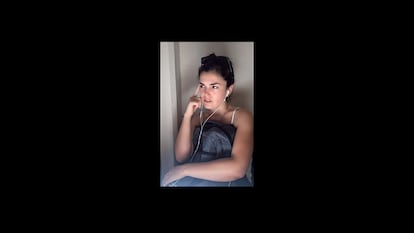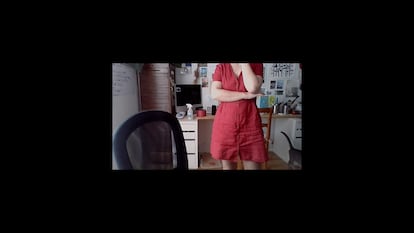The hell that is ‘sextortion’: ‘Tomorrow your contacts will receive you-know-what if you don’t pay up’
It’s a crime whose rates are on the rise around the world, including in Spain, which registered 4,460 reports last year alone. Director Patricia Franquesa, who fell victim to the phenomenon, is turning her experience into a documentary

On May 14, 2019, Patricia Franquesa sat down to eat a fried squid sandwich at a bar, had her laptop stolen, and two months later, received an email: “Hello Patricia. Sadly, this is not spam. This is a serious matter. I have hacked your PC. Don’t be frightened. Everything will be OK. You don’t know me, and I don’t know you. I don’t have any intention of harming you, if you follow these instructions. You’ll have to deposit $2,400 in the following Bitcoin account. I have your work contact lists, social media, email passwords and access to virtual material. I’ve found these (photos attached) and I’m sure that you don’t want all of your contacts, including family members, friends and professional colleagues seeing this.” “This” was three photos of her vagina. “All of her contacts” were around 1,100 people. And Franquesa, whose interview with EL PAÍS took place via Zoom from Barcelona, where she was born in 1989, says that she immediately called the police.
“I had the immediate need to yell ‘help’. My mother taught me that if someone touched me when I was on the bus, I had to say very loudly ‘Sir, do not touch me.’ That way you’d embarrass them, they’d leave, and you’d alert those around you. It was that instinct,” she said on May 14, five years after the theft. She says that she’s “closing a cycle” but that, in reality, this is “a beginning.”
Franquesa, who is a documentary filmmaker, didn’t know when she called the police that what had just happened to her had a name. She learned it just after filing a police report, when officers recommended that she “send an email to all her contacts” alerting them that they could receive the images. She sat down to write that email and “I didn’t really know what to say.” She started searching the internet. “I began to see that this is happening everywhere, and I started to have many questions. I told myself that if I had so many questions, it’s a documentary.”
That was the day she learned about sextortion, a crime that consists of blackmailing someone in exchange for not publishing their sexual content. That was also the day My Sextortion Diary, Franquesa’s lastest work, whose distribution rights have been acquired by Taskovski Film Sales in the United States and which made its U.S. debut at South By Southwest in March, was born. She created a folder on her desktop called “Digital Vagina” and started to save everything.

In Spain, according to numbers from the Ministry of the Interior to which this publication had access, there has been exponential growth in sextortion rates: 1,691 reports in 2018, 1,199 in 2019, 1,923 in 2020, 2,649 in 2021, 3,219 in 2022 and 4,460 in 2023. The number grows every year and although its victims can be of any age, the most frequent targets are young women and children. Franquesa says that “attacks” against women using their sexuality “are common.” “We have always been society’s sexual elements. But I also saw that there were many statistics that referred to adolescents,” she says.
Whoever the victims are, the blackmail has predictable motivations, like economic and financial — demanding money from the victim — or control, which is the case when the perpetrator is someone who they know, or even partners or former partners. Franquesa’s case was economic. Though some victims of this kind of sextortion wind up paying, thinking that this will end the blackmail, oftentimes that’s not what happens, and the criminals insist on receiving more funds.
In August of that year, 2019, the filmmaker received another email: “Hello, Patricia, how was your vacation? I’m about to upload the photos to a website. I have not received any response from you, the bitcoin wallet is still empty, so tomorrow a quarter of your network will receive a message with you-know-what if you don’t make the payment. Want to negotiate? Let’s negotiate. But you have until tomorrow to respond to this email. Please don’t make me do this, pay up and we’ll be done with this. Make an offer.”

Franquesa recalls spending time thinking about “the kind of situations that can leave someone so vulnerable that they think about paying or giving them what they want.” She didn’t give in, the photos began to be sent to some of her contacts, who had been warned that they’d come, and the hacker continued to write to her: “We’ll keep going until the end. I’ll send them to more contacts on Facebook and Instagram. Instagram is very easy, one direct message and everyone will see it.”
And she made a decision: she herself would publish those three photos of her vagina. In a way, this let her take control over the situation. “When you’re going through a criminal and judicial process in which you are legally the victim, you feel more exposed and vulnerable. It was a way of taking back power.”
It wasn’t “easy,” but she sat down and prepared a post for social media. “I am being blackmailed by a group of criminals. They stole my computer with all my archives inside it. They are asking me for money to not share this with you. They’ve already sent emails and messages to extort me, to make me feel so ashamed of my body that I end up paying them. So, I want to publish these photos myself. Please, if you receive any strange message or email through any social media network where my name appears, tell me and don’t erase the message.”
This was also a way of asking for help: “Of saying, ‘Hey, this is happening to me, help me, that way I have more proof to bring to the police.” The response was immediate, there was an avalanche of messages. One friend wrote her that she was “lucky to have so much support.” Franquesa cried: “That makes you feel like you have a security network around you. Family, friends, they are very important.”
Now, five years later, the police have yet to find the extortionist and, though officers in Madrid arrested and sentenced one of the men who stole her computer, they never knew if he was “connected to the hacker.” Because of this, “the story continues because they still have access to a multitude of data like my identification, online documents, passwords.”
Franquesa has many thoughts about what happened to her. About the lack of protection around our online privacy; about the people who asked her why she had those photos on her computer in the first place, as if she were the criminal; about the little boys, girls, teens who are subject to this type of violence. About the legal channels that are sometimes not enough to solve the problem. Also “about telling, sharing, which is hugely important because if you don’t, you become much more isolated, you’re vulnerable, much more fragile and more accessible to being manipulated.” And about “how the violence shifts from our body to the screen. It seems cleaner, it’s more psychological, but the damage is the same.”
The number of the 24-hour, toll-free National Domestic Violence Hotline is 800-7999-7233, or text START to 88788. Services are available in 140+ languages using interpretation services. You can also visit its website at thehotline.org, and chat live with an expert advocate.
Sign up for our weekly newsletter to get more English-language news coverage from EL PAÍS USA Edition
Tu suscripción se está usando en otro dispositivo
¿Quieres añadir otro usuario a tu suscripción?
Si continúas leyendo en este dispositivo, no se podrá leer en el otro.
FlechaTu suscripción se está usando en otro dispositivo y solo puedes acceder a EL PAÍS desde un dispositivo a la vez.
Si quieres compartir tu cuenta, cambia tu suscripción a la modalidad Premium, así podrás añadir otro usuario. Cada uno accederá con su propia cuenta de email, lo que os permitirá personalizar vuestra experiencia en EL PAÍS.
¿Tienes una suscripción de empresa? Accede aquí para contratar más cuentas.
En el caso de no saber quién está usando tu cuenta, te recomendamos cambiar tu contraseña aquí.
Si decides continuar compartiendo tu cuenta, este mensaje se mostrará en tu dispositivo y en el de la otra persona que está usando tu cuenta de forma indefinida, afectando a tu experiencia de lectura. Puedes consultar aquí los términos y condiciones de la suscripción digital.









































